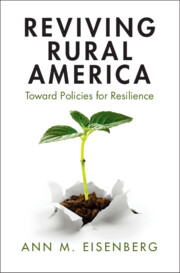Book contents
- Reviving Rural America
- Reviving Rural America
- Copyright page
- Contents
- Figures
- Acknowledgments
- 1 Introduction
- 2 The Foundational Myths
- 3 The Myth of Rural Empowerment
- 4 The Myth of Rural Unsustainability
- 5 The Myth of Rural Decline
- 6 The Myth of Rural Radicalism
- 7 The Myth of Rural Whiteness
- 8 The Myth of Rural Obsolescence
- Index
5 - The Myth of Rural Decline
Published online by Cambridge University Press: 20 June 2024
- Reviving Rural America
- Reviving Rural America
- Copyright page
- Contents
- Figures
- Acknowledgments
- 1 Introduction
- 2 The Foundational Myths
- 3 The Myth of Rural Empowerment
- 4 The Myth of Rural Unsustainability
- 5 The Myth of Rural Decline
- 6 The Myth of Rural Radicalism
- 7 The Myth of Rural Whiteness
- 8 The Myth of Rural Obsolescence
- Index
Summary
This chapter challenges the idea that rural communities have “declined.” It argues that the term, “decline,” discounts how laws and policies have actively facilitated rural marginalization and socioeconomic distress for decades. “Decline” reframes an active phenomenon as one that occurred passively, making current rural challenges seem natural and inevitable. The chapter assesses how twentieth- and twenty-first-century federal and state laws and policies undermined traditional rural livelihoods in agriculture, natural resource and energy development, and manufacturing. The chapter then provides a legal history of transportation and telecommunications deregulation, and the role deregulation played in exacerbating geographic inequality. Overall, the chapter proposes that instead of declining, rural communities have been undermined, as policymakers have consciously traded rural welfare for some other perceived benefit. While those trade-offs may have afforded tangible societal benefits in some fashion, the decline framing discounts how rural communities were in fact knowingly sacrificed in the name of the greater good.
Keywords
- Type
- Chapter
- Information
- Reviving Rural AmericaToward Policies for Resilience, pp. 99 - 129Publisher: Cambridge University PressPrint publication year: 2024

